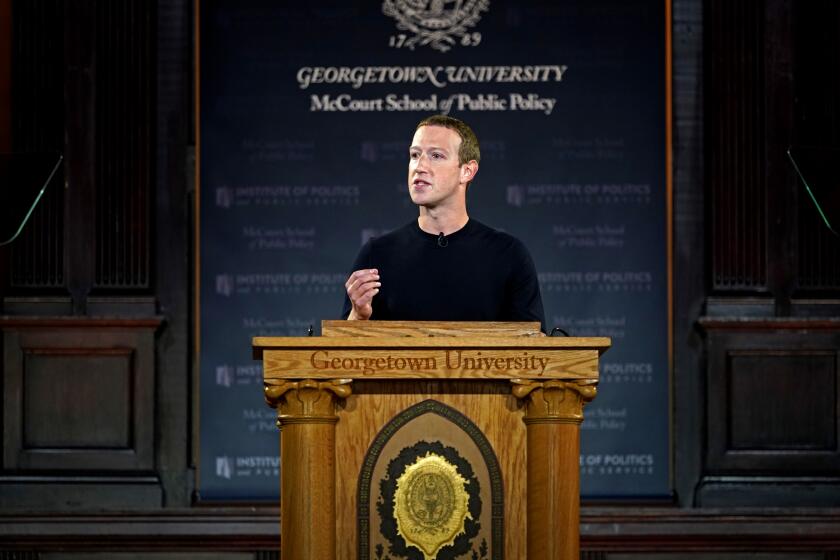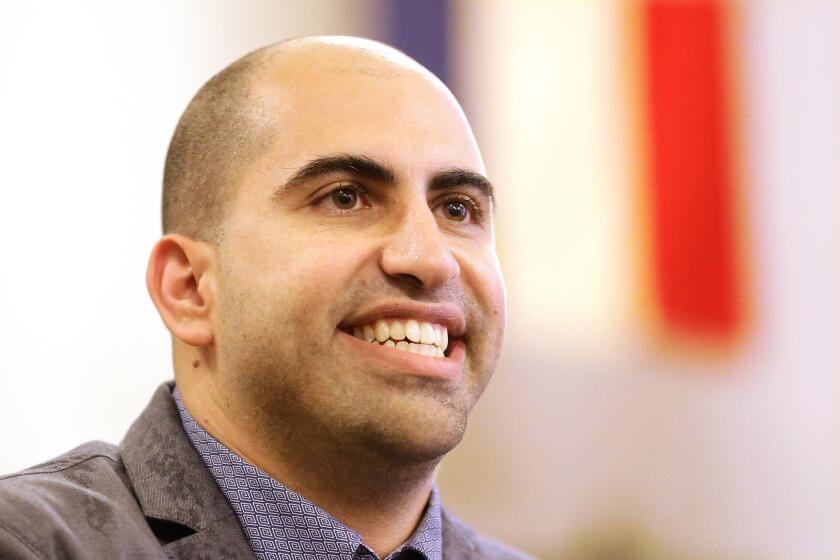Column: Newsweek apologized for racism in a Chapman prof’s op-ed. Should Chapman disavow it too?
- Share via
The behavior of university faculty members, especially once they have achieved the nearly impregnable job security that comes with tenure, can be embarrassing when they espouse viewpoints that shouldn’t be uttered in a civilized setting.
That inconvenient truth is brought to mind by an op-ed penned recently by John Eastman, a tenured professor at the Fowler School of Law at Orange-based Chapman University.
A Chapman faculty member since 1999 and the law school’s former dean, Eastman questions the eligibility of Kamala Harris to run for vice president — indeed, her eligibility to hold the Senate seat she currently occupies.
The op-ed was never intended to spark or to take part in the racist lie of Birtherism, the conspiracy theory aimed at delegitimizing Barack Obama, but we should have recognized the potential, even probability, that that could happen.
— Newsweek apologizes for a birther op-ed
Eastman’s op-ed, which appeared in Newsweek on Wednesday, the day after presumptive Democratic presidential nominee Joe Biden chose Harris as his vice presidential running mate, caused an immediate furor.
That’s because it seemed to evoke the discredited and discreditable “birther” controversy that questioned Barack Obama’s eligibility as president — a claim promoted forcibly by Donald Trump during the Obama administration. Few could have overlooked that doubts about the citizenship of politicians had now been sowed against two national political leaders of color.
Newsweek has apologized for publishing the piece. Chapman on Monday issued a statement attributed to its president, Daniele Struppa, that “the university is not responsible for the ideas of its faculty.” But Struppa declined to criticize the op-ed itself, asserting that “if anyone in a position of authority were to publicly criticize faculty work, it would create a dangerous chilling effect on the culture of academic freedom that defines a university.”
The Chapman faculty has been stirred. More than one-third of the faculty has signed a petition calling for enhanced diversity and inclusion on the campus. Struppa responded by expressing his “unwavering commitment to a diverse and inclusive community at Chapman.”
But he hasn’t yet responded to the petition’s demand for concrete action, including filling an open position overseeing campus diversity.
Should Chapman go further to disavow Eastman’s op-ed? The answer is yes. And not merely because a threadbare argument being posed by a faculty member has been taken up by President Trump, who cites Eastman as a “very highly qualified” lawyer. Trump didn’t explicitly endorse Eastman’s argument, but didn’t disavow it either.
“Chapman is being associated with the vilest notions of anti-immigrant sentiment and racism, via birtherism 2.0,” Lisa Leitz, Chapman’s professor of peace studies and an organizer of the petition, said Monday. “This undermines the work of many Chapman faculty and students who have long worked to increase the institution’s diversity and inclusion.”
The core of Eastman’s argument is that Harris, though born in Oakland, was the daughter of two parents who were living in the U.S. on visas and therefore may not be a citizen.
According to the 14th Amendment, which dates to 1868, “all persons born or naturalized in the United States and subject to the jurisdiction thereof, are citizens.” Eastman asks, “Were Harris’ parents lawful permanent residents at the time of her birth?...Or were they instead, as seems to be the case, merely temporary visitors?”
Henry A. Wallace, FDR’s vice president, foresaw the fascism of Trump.
If the latter were the case, he writes, “then derivatively from her parents, Harris was not subject to the complete jurisdiction of the United States at birth, but instead owed her allegiance to a foreign power or powers — Jamaica, in the case of her father, and India, in the case of her mother — and was therefore not entitled to birthright citizenship under the 14th Amendment as originally understood.”
Eastman told me he’s most troubled by what he calls the “false charge that I simply made this stuff up because Kamala Harris is black.” He points out that he’s been studying and writing about so-called birthright citizenship for nearly 20 years “in all sorts of contexts,” not merely black politicians.
“There is a serious scholarly debate about the meaning of the ‘subject to the jurisdiction’ phrase that has never been resolved by the Supreme Court,” he says. “Those that claim it is long-settled law are simply lying....In fact, it’s racist to say that Harris ought to be exempt from the same kind of inquiry that has been posed about others.”
Yet even though the Supreme Court has not, legal scholars have. The vast weight of their research appears to fall in the opposite side from Eastman and a small cadre of conservative scholars, many at the Claremont Institute in Upland, where Eastman is listed as a senior fellow and where Josh Hammer, the Newsweek opinion editor who oversaw the op-ed’s publication, is a former fellow.
Eastman’s parsing of the 14th Amendment’s language aren’t even accepted by many conservative legal scholars. One of them, UCLA’s Eugene Volokh, even wrote a piece for Newsweek debunking Eastman’s case. The libertarian Cato Institute calls Eastman’s argument, charitably, an “unorthodox view.”
Newsweek initially responded to the uproar over Eastman’s piece with an editor’s note headlined, “Eastman’s Newsweek Column Has Nothing to Do With Racist Birtherism,” which Shakespeare might have faulted for “protesting too much.”
This hints at the problem often compared to putting toothpaste back in the tube: When you have to explain why an article isn’t espousing a racist viewpoint, you’re already straining to drive uphill.
In a second editor’s note (pro tip — when you have to write an editor’s note apologizing for an editor’s note, you’re really in trouble), Newsweek tried to cast the op-ed as an attempt to explore a minority legal argument about the definition of who is a ‘natural-born citizen’ in the United States.”
That pleads that the op-ed was about something of merely academic interest, which raises the question of why it belonged in Newsweek at all instead of a law review.
Newsweek implies that the conclusion that Eastman’s piece might be interpreted as racist struck its editors like a bolt from the blue. “To many readers,” it says, “the essay inevitably conveyed the ugly message that Senator Kamala Harris, a woman of color and the child of immigrants, was somehow not truly American.”
“The op-ed was never intended to spark or to take part in the racist lie of Birtherism, the conspiracy theory aimed at delegitimizing Barack Obama, but we should have recognized the potential, even probability, that that could happen.... All of us at Newsweek are horrified that this op-ed gave rise to a wave of vile Birtherism directed at Senator Harris.”
It’s long past time for Facebook to take complaints about hate speech and misinformation as more than occasions for navel-gazing.
Eastman says he wasn’t happy with the second editor’s note. “It was an apology for not anticipating how white racists might misuse my argument,” he says, “but nobody has pointed out to me any such white racist group misusing the argument. If there is anything like that out there, I’d be happy to refute it.”
Eastman’s op-ed and Newsweek’s apology take advantage of an old dodge identified by George Orwell in 1945 as a defense against accusations of anti-Semitism in Britain: the claim that one is just engaging in an “observation of the facts.”
As Orwell wrote then, “naturally the anti-Semite thinks of himself as a reasonable being.” Consequently, his anti-Semitism is cloaked as a search for facts wholly independent from their anti-Semitic import. This is precisely the same phenomenon at work both in Eastman’s op-ed and Newsweek’s defense of its publication.
It’s proper to take a closer look at Eastman’s argument and background, to divine whether Newsweek could have been as innocent as all that.
As for questioning the breadth of “birthright citizenship,” Eastman has been flogging this dead horse for years.
In other words, Newsweek undoubtedly walked into the morass of the “birthright” racist trope with its eyes wide open.
That leaves us with the question of how Chapman should respond to the retailing of a potentially racist trope by a faculty member. No one is suggesting that Eastman lose his job over his views, but that doesn’t mean that Chapman can’t take a stronger stand on its own. Its reputation, after all, is on the line whether it likes it or not.
Cases in which a tenured faculty member, or even an untenured teacher, take wholly noxious stands don’t occur all that often, but they’re not unprecedented.
Responding to an academia-wide furor about the firing of a faculty member over a series of provocative tweets on Israel and Gaza, the University of Illinois board of trustees last week took a vote on the case.
Take the case of Kevin McDonald, a tenured member of the psychology department at Cal State Long Beach, whose identification with anti-Semitic conspiracy theories tied the university in knots starting in the mid-1990s.
In published works, McDonald’s arguments that Jewish elitism fostered anti-Semitism were labeled as anti-Semitic and neo-Nazi propaganda by the Southern Poverty Law Center. “Given the prospect that Jews will continue as an elite hostile toward White America,” he wrote in 2013, “the future of Whites in America is grim indeed.”
Concern about his membership on the CSULB faculty intensified after he testified in 2000 on behalf of Holocaust denier David Irving in Irving’s unsuccessful libel suit against American Holocaust scholar Deborah Lipstadt.
CSULB’s academic leadership released a series of increasingly critical statements about McDonald.
These culminated in a 2008 statement from the university’s Academic Senate that set forth his white supremacist associations in detail, noted the risk to CSULB’s reputation, and stated that “while the Academic Senate defends Dr. Kevin MacDonald’s academic freedom and freedom of speech, as it does for all faculty, it firmly and unequivocally disassociates itself from the anti-Semitic and white ethnocentric views he has expressed.”
McDonald finally took early retirement in 2014.
The CSULB statement could be a model for Chapman and its law school faculty. Struppa’s statement takes the easy way out. It upholds the principle of academic freedom without being at all clear about what the Eastman case is about.
Struppa’s allusion to his “unwavering commitment to a diverse and inclusive community at Chapman” is far too narrow. The issue isn’t the diversity of the Chapman community, but the diversity of the American body politic, and one faculty member’s years long campaign to narrow it.
Chapman and its law faculty need to make a full-throated statement of its commitment to a U.S. Constitution that has been a bulwark against racist discrimination. Its own name is at stake.
More to Read
Inside the business of entertainment
The Wide Shot brings you news, analysis and insights on everything from streaming wars to production — and what it all means for the future.
You may occasionally receive promotional content from the Los Angeles Times.













